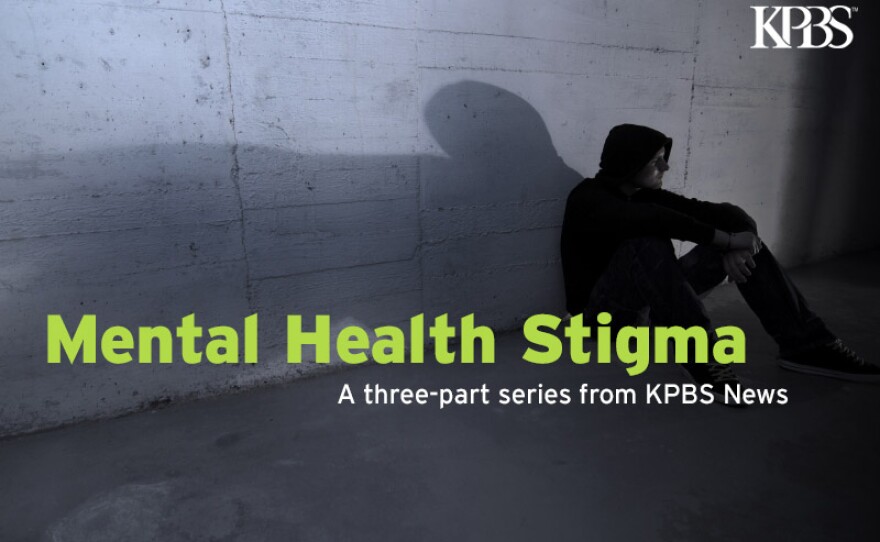Editor’s note: This is the first of a three-part series.Evan Hilliard had a tough childhood.
His father died when Hilliard was seven. He remembers having his first thoughts of suicide shortly after that.
At age 13, Hilliard spent a month-and-a-half in a psychiatric hospital.
When Hilliard got out, he didn’t tell his classmates where he had been.
“And that was because of stigma, ’cause I didn’t want to be labeled," Hilliard recalled. “It’s already hard to fit into school, so I didn’t want any other hardships with that.”
Nearly one out of five Americans suffer from mental illness. But that hasn’t prevented the stigma of mental illness from being a powerful and damaging force.
Hilliard was initially diagnosed with depression. Then bipolar disorder. Then schizoaffective disorder. But he never talked about it.
Part Two: Stigma Against Mental Illness Is Built In To Health Care System
Part Three: Education Is Key To Conquering Stigma Against Mental Illness
Hilliard was hospitalized in 2011 for the fifth time. When he was released, he decided not to keep his condition secret anymore.
“I just didn’t want to die without anybody knowing who I was," Hilliard said. "And I felt like I was on the road to killing myself. I was thinking about killing myself just about every single day since I was nine.”

Stigma is destructive
The stigma of mental illness is a destructive force. It prevents people from admitting they have a problem. That stigma also prevents people from seeking help. And it can increase the pain experienced by those who are struggling to get well.
Michelle Ahkoi, who has bipolar disorder, believes the mental illness stigma is everywhere, especially in the media.
“The media portrays us as like crazy people, or we’re gonna hurt you," she said. "And sometimes, yes, we go through hospitalizations, or things that are a little intense, like my manic episodes, but I don’t hurt people.”
Mental illness equals violence?
Yet many Americans equate mental illness with violence.
For example, after the November mass shooting at a Texas church, President Trump said guns weren’t the problem.
“I think mental health was the problem here," Trump said at a press conference. "This was, based on preliminary reports, a very deranged individual."
Dr. Michael Plopper, medical director at Sharp Mesa Vista Hospital, the largest private mental health facility in Southern California, said Trump's language was way off base.
"“I think that that is very stigmatizing," he said, referring to the president's remarks. "So, we’re having to overcome that type of rhetoric.”

Plopper believes when it comes to violence and mental illness, people need to get a reality check.
“So there’s this misbelief that people with mental illness are more prone to be violent. There’s a very small percentage of people with very specific type of disorders in which that can be true," he said. "But the vast majority of people with all types of mental illness, from minor to severe, are not violent people.”
Dr. Jim Dunford, professor emeritus of emergency medicine at UC San Diego School of Medicine, said despite the advances in awareness and treatment, there’s a persistent notion that mental illness is a moral failing.
“There is a continuing belief on the part of some people that you’re weak, right? The old theory was that you had to cope with these things on your own," Dunford said.
As Evan Hilliard explained it, for most of his life, that kind of stigma made him feel terrible.
“I felt like I couldn’t be myself, I felt like I couldn’t be vulnerable with other people, I felt like I couldn’t be authentic," he said.
Acceptance
Today, Hilliard works as a peer support specialist at a local nonprofit agency.
He’s also on the board of the nonprofit Impact Young Adults. The group's mission is to encourage young people with mental health challenges to reach out, make friends, and socialize.
Impact Young Adults believes mental illnesses are chronic conditions like diabetes or hypertension. And just like those disorders, mental illnesses need to be properly treated and managed.
In other words, mental illnesses are medical conditions - they’re not a sign of weakness.
Now that he’s accepted his condition, Hilliard has stopped concealing it, and he’s trying to take an active role in fighting stigma.
“I think it’s important to show people what mental illness really looks like, so that we don’t label people without understanding what’s going on," Hilliard explained. "And I just want to help. I know for a long time I was suffering. And I know many other people are suffering, too.”






